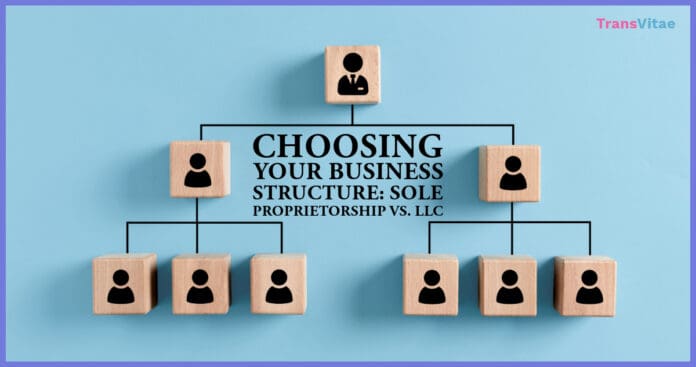Starting a small business is like embarking on a journey full of surprises, challenges, and triumphs. As you set out on this entrepreneurial adventure, one of the first decisions you’ll face is selecting the right type of business structure. It’s like choosing between a backpack and a suitcase before a trip; each has its benefits and limitations.
If you’re a trans entrepreneur navigating these waters, understanding the differences between a Sole Proprietorship and a Limited Liability Company (LLC) is crucial. Let’s dive in and explore these options, ensuring your business journey starts on the right foot.
Sole Proprietorship: The Solo Performance
Imagine you’re a solo artist producing your music. As a Sole Proprietorship, you’re the show’s star, director, and producer. This business structure is the simplest and most straightforward way to start your venture. It doesn’t require registering your business with the state (except maybe to file a DBA, “Doing Business As”), making it a cost-effective and uncomplicated option. Here’s what makes a Sole Proprietorship stand out:
Pros:
- Easy Setup: Like a pop-up performance, starting is as simple as deciding to start. There’s no formal paperwork for establishing your business, aside from potential industry-specific licenses.
- Direct Control: You’re in the driver’s seat, making all the decisions without needing consensus or approval from others.
- Straightforward Taxation: Profits and losses flow directly to your personal tax return, making tax time less of a headache. It’s like a one-person band where you’re managing the tunes.
Cons:
- Personal Liability: If your business hits a sour note, your personal assets (like your car or home) could be at risk to settle business debts. It’s the equivalent of falling on stage without a safety net.
- Limited Funding Options: Raising capital might be tougher, as you can’t sell stock, and some investors might be hesitant to back a Sole Proprietorship. It’s a bit like trying to book gigs without a demo tape.
LLC: The Band Comes Together
Forming an LLC is like forming a band. You’re bringing together different elements under one name, offering protection and flexibility. An LLC is a legal entity separate from its owners (called “members”), providing a shield for your personal assets against business debts and claims. Here’s the breakdown:
Pros:
- Limited Liability Protection: If the business faces a lawsuit or debt, your personal assets (like your savings or house) are usually protected. It’s the security of performing behind a sturdy barrier.
- Flexible Taxation: LLCs offer the best of both worlds. You can choose to be taxed as a Sole Proprietor, Partnership, or Corporation, giving you flexibility in managing your financial affairs.
- Credibility and Growth: An LLC can enhance your business’s credibility, attracting more customers and investors. Plus, it’s easier to secure funding, and you have the option to add members to grow your business. It’s like having the option to add more band members to play larger venues.
Cons:
- More Paperwork and Fees: Starting an LLC involves filing articles of organization with your state, paying filing fees, and potentially dealing with more ongoing paperwork. It’s the difference between a garage band and a band that’s signed with a label.
- Tax Considerations: Depending on how you structure your LLC, you might face self-employment taxes on your entire net income. It’s important to tune your structure with the help of a financial advisor.
Which Should You Choose?
Deciding between a Sole Proprietorship and an LLC is like choosing between a solo acoustic set and a full band concert. Both have their charm, but the right choice depends on your specific situation.
- Risk vs. Reward: If you’re starting a low-risk business and want to keep things simple, a Sole Proprietorship might be your best bet. It’s the unplugged version of business structures—intimate and straightforward. However, if you’re in an industry with higher risk or you have significant personal assets to protect, forming an LLC could be the equivalent of having a full sound crew and security team—worth the investment for the protection and peace of mind.
- Growth and Vision: Consider where you see your business in the future. If you’re aiming for a solo career with minimal complications, stick to the Sole Proprietorship. But if you’re dreaming of headlining bigger venues and possibly bringing more members into the band, an LLC offers the structure and flexibility to scale up.
- Tax Implications: Taxes can be as complex as a prog rock concept album. A Sole Proprietorship offers simplicity, but an LLC provides flexibility. Discuss your plans with a tax professional to understand the best rhythm for your financial situation.
The Bottom Line
As a trans entrepreneur, choosing a business structure that aligns with your identity and values is important. Whether you opt for the solo journey of a Sole Proprietorship or the collaborative ensemble of an LLC, ensure your business structure supports your vision of empowerment, inclusivity, and growth.
Starting a business is a bold step towards creating a world that reflects your unique perspective and talents. By understanding the differences between a Sole Proprietorship and an LLC, you’re better equipped to choose the path that resonates with your entrepreneurial spirit and personal journey.
Remember, in business as in life, the most important thing is to stay true to yourself, embrace your identity, and pursue your dreams with confidence. The right business structure is out there, ready to support your journey to success.
Disclaimer: The information provided in this article is for general informational and educational purposes only. The content is not intended to serve as legal, tax, or financial advice, nor does it aim to address the specific circumstances of any individual or entity. Readers are encouraged to consult with professional advisors for advice tailored to their particular situations.


